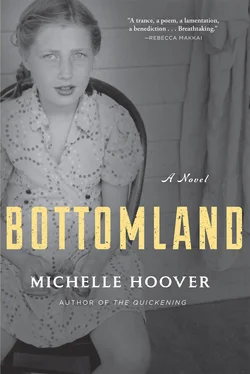The Huns still had it coming to them. That’s what Stan said. “When we hit them again, they’ll think it’s worse than the flu.” Stan was grinning with his big cheeks, his front tooth gone missing. But it wasn’t so funny. Only the month before, our runner had a letter from home. His father, a man hardy to his fingertips, gone down to a thing a person couldn’t even fight. Our runner had been a sad boy, then he’d taken to the flu too. No runner for the squad, no orders in or out.
“You’re all one for starting up again,” Critters said. “But just get me to the village. A roof and walls. Fritz will sign for peace any minute.”
“I’d keep my hat on if I were you,” Stan said. “Fritz isn’t signing anything.”
Critters sank back against the fence. He was thin to his britches, thin even in his hands. He shook when he got nervous, and he was done with being nervous now. “We’ve been on the line ten days,” he whined. Sam Bullet smacked him on the head.
It’d been a long run. Too cold and wet to take off our boots, the oil gone so we couldn’t grease our feet. Too tight at night to sleep in the hole together. But the village was worse. Not a young man in sight. Only women and old hands. Plenty of houses emptied out. Plenty chance for surprises. When the guns were down, the village was fine enough for sleeping, but it was frightful dirty and the pantries dry. So much manure in the streets, the place was rich with the stuff. On the road, we’d walked through dozens of towns just the same. Fog heavy in the hills, columns of tanks and infantry lines. Many a dead German, too. To the east, the plains of the Rhine and no mountains. Artillery sparks shone far off in the flats, the echo of guns whenever we slept. This was borderland France, but most of the people spoke German, wore wooden shoes. They drank schnapps and wine in heavy cups, and they hated the Kaiser as much as any of us.
“I’ve got to have something to stick to my ribs,” Critters said. “I’m dying here.”
“You’ll die faster if you go down to the village,” Sam Bullet said.
Critters itched his feet.
“And don’t you dare take off those boots,” Bullet said. “You’ll never get them back on.”
“Stinks,” Stan said.
“Hush’s feet stink worse than mine,” Critters said.
One stink was like any other. Numb, now that was something to worry about.
The next morning was quiet. By afternoon we walked to the village hoping for a meal and laid our bags in an empty farmhouse. They had a sofa in that place and a few metal pots, but not a picture on the walls. Nothing more than a lace dress hanging in the closet. We had a roof, but the cupboards were cleared and our men hungry starved, ropes cinching their trousers. Sometimes they didn’t call me Hush anymore. “Hess,” they said. “Hess, go fish something out for us from the Krauts.” I didn’t know the kind of German they used around here. I hardly knew German at all, but the boys looked at me like I did.
“I’d think you were one of them,” Stan said through his missing tooth. “If I didn’t know better. Walked right out of the fields without your lederhosen, that’s what I’d think. We need a little grub is all. If our neighbors got the extra.”
“What neighbors?” Bullet asked.
Critters sat up on his elbows. “You sending him for food?”
“That’s up to him.”
“He’s not going anywhere,” Bullet said. “We’ve got our orders.”
Critters moaned and dropped back on the sofa. He took out his wallet and mooned at a picture of his girl. I looked over his shoulder. “That’s Belle,” he said. “She’s something, ain’t she?”
I nodded.
“You got a girl?”
I didn’t answer.
“Guess that means no.”
“Hush doesn’t have a girl,” Stan said.
“God damn if I have to spend another night.”
“We’re out of the woods at least.”
“We’re starving. Belle won’t recognize me if Fritz signs. I’m walking bones.”
I swung to my feet and put on my cap.
“Where you going, Hush?” Stan and Critters asked.
“Taking a walk.”
I stumbled out. I had a rope around my trousers too, my boots too small by half. Critters said that was the better. His were three times over and he could fit plenty of socks. Still he fell on his nose with every root and pebble, and we had socks hardly at all. Days before when I took my boots off, my feet were some swollen. They felt full of pebbles. I didn’t want to step too hard.
Bullet thought we wouldn’t find a crumb, but I thought we could. Bullet looked like Ray, talked like him. He was sure solid in the woods and always at the ready. But maybe, if a boy tried a door or two and had the name of Hess. A face of a Hess too. Maybe there was something in that.
I passed row after row of houses set close to the road, most of them empty. A man could smell that. There were other houses a ways back, the barns in front, sheds all around. But there wasn’t an animal left in those barns. A man could smell that too. Far off, a cabin sat high on the hill, a flash of light. I followed the road up, losing my breath. A garden of what must’ve been cabbage lined the yard, eaten to scrub. The fence had been set right, a dead German hanging over it. He was a handsome one with his yellow hair, his uniform old and crusted, his face frosted white. Not so handsome when I saw that. Strange they’d let him hang there, German or not.
The door of the house opened and I jumped. A man, tall as he was wide. He wore a hat and apron seemed made of straw, his thumbs hooked in his trouser pockets. Smoke drifted through the door behind him. Sure he would shut the door on me. Get his gun.
“ Essen? ” I asked. I lifted my arm to show him my uniform. “ Essen, bitte? ”
He eyed the German on the fence and eyed me some different. Then he pointed at his chest. “Schmidt.”
“Hess,” I said back.
He cocked his head and grinned, waving me inside.
The house was low and dark, but it seemed a good place. Simple enough. Brick for the floors, brick for walls. In the corner, a fireplace stood so large it took up the room by half, but it wasn’t but a little warm. A girl huddled in a blanket, only her forehead showing. When Schmidt stepped out the back door, she spat a question I couldn’t understand. Soon Schmidt stood at the threshold again, studying me and the girl. “ Alles in ordnung? ” he said. She didn’t say a thing. “ Der tote Mann ,” he said, to me this time. He pointed at the man on the fence. “ Er hat sie angefasst. Verstehen? ” In his fist, three rabbits hung by their feet. They fidgeted and kicked, but that fist was as big as the three put together.
“The soldier?”
“ Ach, du verstehst ,” he said. “ Dieser Mann, ein Teufel. ” With a flip of his wrist, he broke the rabbits’ necks.
In the backyard, the girl gathered wood and Schmidt laid the rabbits on a stump. He took out his knife by the blade, offered the handle. I had skinned rabbits plenty. Never had a taste for it. Still I wondered at how easy the coat pulled. How the innards rose when you split the stomach. Save it for the foxes , Father would have said, drawing them out. It’d been a while since I’d done such a thing. Weeks since I’d had a good bite. I tore back the skins, threw the innards to the ground. But even foxes seemed a waste of innards now. Everything I cut away, the head, the feet, it only made the meat less. Still Schmidt seemed mighty pleased. “ Gut, gut ,” he said.
We made a fire in a pit in front of the house. The smell of roasting meat brought the boys to the fence. The dead German, he was nowhere. I wondered if the boys’d had time to lay him out, cover his face. If I hadn’t been eager for food, I might have done so myself. But maybe after what Schmidt said, the German wasn’t worth even that.
Читать дальше












